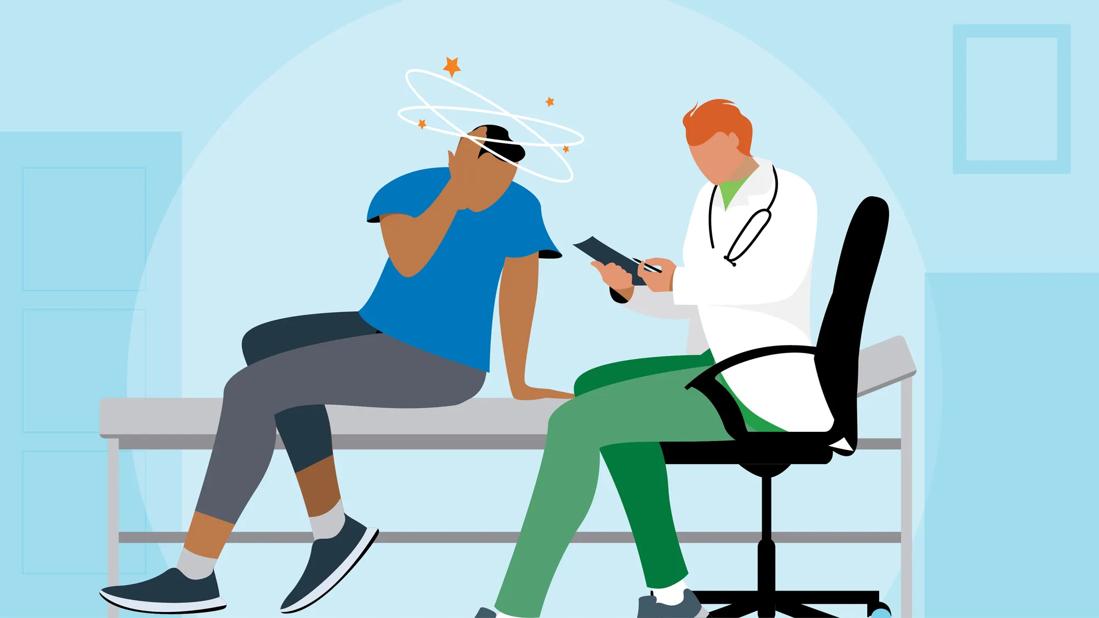While similar, one may make you feel lightheaded, while the other can cause a spinning sensation

Image content: This image is available to view online.
View image online (https://assets.clevelandclinic.org/transform/a0bfaae3-b1b3-4252-8023-5e2f1061af3f/patient-dizzy-doc-1265164320)
Dizzy patient sitting on exam table in medical office, talking to healthcare provider
If you’ve ever had a case of the spins, then you’ve probably wondered about vertigo.
Advertisement
Cleveland Clinic is a non-profit academic medical center. Advertising on our site helps support our mission. We do not endorse non-Cleveland Clinic products or services. Policy
The trouble is, there are many variations to your equilibrium feeling wonky — vertigo, dizziness, unsteadiness, off-balance. It can be hard to recognize if you’re just feeling dizzy or if you’re experiencing true vertigo.
“It used to be that dizziness was the umbrella term, and vertigo fit underneath it,” explains audiologist Julie Honaker, PhD. “But now, we’re finding that dizziness is very separate from vertigo.”
Our balance system is our sixth sense and sometimes, we don’t fully appreciate it until something goes wrong with it. Dr. Honaker discusses vertigo vs. dizziness and why it’s important to talk to a healthcare provider about your symptoms.
When it comes to vertigo vs. dizziness, it can be easy to get confused.
Dizziness is an altered sense of spatial orientation, a distortion of where we’re within a space and your balance just feels off. You may feel light-headed, woozy and like you might fall if you don’t sit down.
Vertigo, on the other hand, is truly the sensation of self-movement or the movement of your surroundings — it’s a spinning sensation. The atmosphere around you may feel like it’s moving or spinning when it isn’t.
“Vertigo can be very debilitating,” states Dr. Honaker. “It can bring on other symptoms of imbalance, too. I think the scariest thing is the fact that it comes on so abruptly. Even though it’s very short, it’s a very, very strong response.”
Advertisement
If you’ve been experiencing balance issues of any kind, you should first and foremost check in with a healthcare provider. It’s important to understand what’s triggering this reaction and/or to see if there’s a pattern.
Do you remember what you were doing at the time when your symptoms came on? Do you have other related symptoms like nausea or head pain? Was it brought on by a change in position?
“If we can start to identify these types of things with your vertigo, it will help us properly diagnose you and get you on the correct management path,” Dr. Honaker says. “You can even start by seeing your primary care doctor first.”
Sometimes, there are very common reasons for experiencing dizziness and vertigo and they can be easily addressed and managed through therapy and medication.
Your balance system is complex. There can be numerous reasons why something is throwing it off.
Possible dizziness causes may include:
Possible vertigo causes may include:
If you’ve been experiencing vertigo or feeling dizzy, in addition to talking to your healthcare provider, one of the best things you can do for your balance system is to take care of yourself. This includes:
“You want to make sure your body is working in its prime, which can ward off symptoms of dizziness and vertigo,” stresses Dr. Honaker.
Whether you’re feeling lightheaded or feel like the room is spinning, it can be easy to confuse feeling dizzy vs. vertigo. And while you may dismiss these symptoms, Dr. Honaker says it’s best to talk to a doctor, as both dizziness and vertigo can be signs of a medical condition.
So, make sure you pay attention to how you’re feeling and note any changes in your balance and if they happen frequently.
“We don’t start to appreciate balance system decline until we notice changes, like symptoms of vertigo or problems with our ability to walk or not feeling as steady as we used to,” recognizes Dr. Honaker. “That’s when we start to notice things going awry. For preventive measures, the best thing to do is maintain good health.”
Advertisement

Sign up for our Health Essentials emails for expert guidance on nutrition, fitness, sleep, skin care and more.
Learn more about our editorial process.
Advertisement
Dizziness typically falls into two categories
Mornings can be hard enough without feeling dizzy, too
The short answer from a cardiologist
Understanding dizzy spells, what causes them and how to exercise if you get them
This spinning sensation is a symptom, not a condition, so you need to know what’s causing it before you can treat it
Fainting, heart palpitations and shortness of breath are just a few signs your heart may need help
An allergist explains this uncommon but unsettling symptom
You may feel dizzy, or just lightheaded and unsteady
Although it could be used as a moisturizer, this new trend is not recommended
Communicating clear limits helps protect your time, energy and emotional well-being
High cholesterol can be genetic, but testing and treatment can lower your heart disease risk